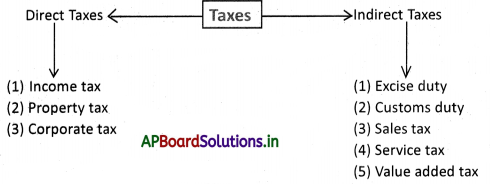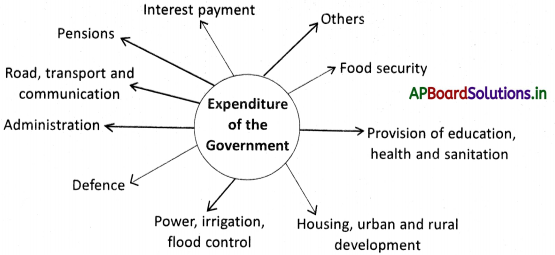Students can go through AP State Board 9th Class Social Studies Notes Chapter 11 The Government Budget and Taxation to understand and remember the concept easily.
AP State Board Syllabus 9th Class Social Studies Notes Chapter 11 The Government Budget and Taxation
→ The government is responsible for a number of crucial functions. It has to perform both developmental and non-developmental functions.
→ To fulfill the various roles, the government must have adequate money. The money is collected from the people in the form of taxes. Revenues are necessary to finance the expenditure of the government
→ In 2011-12, the government spent around Rs. 23,00,000 crores in lots of heads. Nearly one-fourth of the total spending of the Indian economy is by the government
→ Taxes are levied with thorough approval of the Parliament
→ Taxes are the main sources of revenue for the government The taxes can broadly be classified into two categories
- Direct taxes
- Indirect taxes.
![]()
→ Excise duty, customs duty, VAT, sales tax, service taxes are indirect taxes. VAT has certain advantages.
→ Income tax, property tax, and corporate tax are indirect taxes.
→ In adopting a method of taxation, the government should be careful The poor should be exempted from paying taxes. Essential goes should not be taxed. Tax on luxuries can be increased Agriculture income is exempted from taxes.
→ There are many “tax evaders” and a lot of black money. To get hold of this hoard of money, the income tax department raids many people’s places.
→ Annual Budget: A written format of expected incomes and anticipated expenditure prepared by the Central or State Governments for a financial year.
→ Black Money: Many people do not disclose their entire income or show it to be less than what it actually is. This income which is kept hidden is known as black money.
→ Value Added Tax: VAT is a tax that is added to the price of goods and services.
→ Corporate tax: Corporate tax is the tax levied on the yearly profit of companies and business establishments.
→ Income tax: A direct tax in which tax is levied on the personal income of individuals.
→ Direct tax: Direct tax is that type of tax in which the tax burden will be on the same person on whom the tax is levied. e.g.: Income tax.
→ Indirect tax: Indirect tax is that type of tax in which the tax is levied on one person and the burden is shifted to some other person. e.g.: Excise duty.
![]()
→ Subsidies: The difference between the market price and the price at which the goods are offered is the subsidy given to the poor.
→ Consumers: Consumers are the persons who directly utilize the goods.


→ Subsidies: Money paid by the government to reduce the cost of certain important goods such as fertilizers, food grains, diesel, and other important goods so that their prices can be kept low and affordable to all.